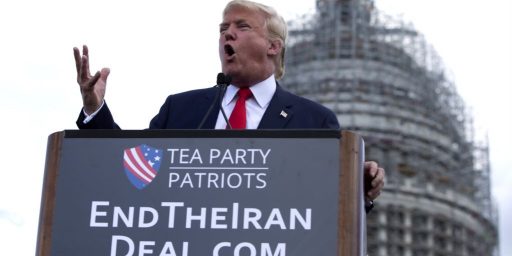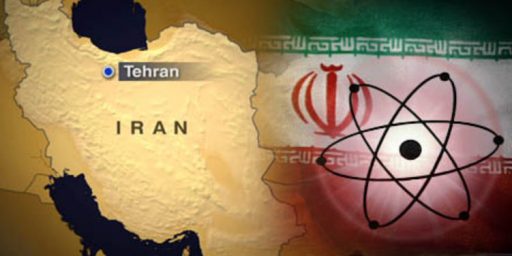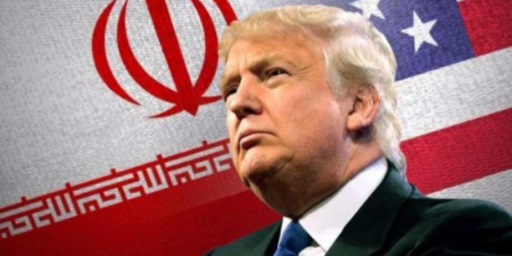Iran Nuclear Talks End With No Progress
The latest round of talks aimed at finding at diplomatic solution to the problem Iran’s nuclear program have ended in apparent failure:
ALMATY, Kazakhstan — Negotiations over Iran’s disputed nuclear program broke off Saturday with scant signs of incremental progress, much less an agreement on tighter controls and tougher international oversight demanded by six world powers in exchange for some easing of sanctions that have a stranglehold on the Iranian economy.
The failure to reach any accord was a serious setback for the talks, which have become complicated by the Iranian presidential election just 10 weeks away.
Catherine Ashton, the European Union’s foreign policy chief, said that after two days of “long and intense discussions,” the sides “remain far apart on the substance.”
No future negotiations were announced, and Ms. Ashton said she would be “in touch very soon” with the top Iranian negotiator, Saeed Jalili, “in order to see how to go forward.”
Russia’s lead negotiator at the talks, Sergei Ryabkov, also sounded a dark note but said there was still hope for future discussions.
“Unfortunately, we failed to achieve a breakthrough,” Mr. Ryabkov, a deputy foreign minister, said at a briefing at the Russian Consulate in Almaty, according to the Interfax news service. “We’re still on the threshold.”
The futility of the talks was certain to arouse renewed alarm, particularly from Israel, which had tempered its repeated threats of a military strike against Iranian nuclear sites in deference to the diplomatic efforts.
The conclusion of the talks without even a modest confidence-building measure or the clear prospect of future talks was striking given that all sides seemed to have incentives to keep the conversation going, and avoid talk of military intervention.
It’s unclear where things go from here. Another round of sanctions designed to put even more of an economic squeeze on Iran in the hopes that this will lead them to make concessions seems probable, but the sanctions we’ve put in place so far have been pretty strong already and they’ve obviously gone nowhere. In any event, regardless of what happens on the sanctions front, I wouldn’t be surprised to see the Israelis and others beating the drums of war again.






One of the lessons of our 2nd Iraq War was that if you don’t have nuclear weapons, and you become the Hitler Of The Week, we will invade. Kim Jung Un has impunity to rattle sabers because he does have nuclear weapons, Sadaam Hussein did not.
This is one of the reasons that I think the 2nd Iraq War was such a disaster. It harmed our national security, by sendi the wrong message to our enemies — get nuclear weapons as fast as you can, or this will happen to you.
I really don’t see how we discourage the Iranians from acquiring nuclear weapons short of a full scale invasion now. And, I don’t think there is a great will among the American people for yet another war (another one of the reasons the 2nd Iraq War was such a disaster — war fatigue, which ties the hands of our government).
@Gustopher:
The other example to add to your equation of Gadaffi. After the Iraq War, he voluntarily surrendered his entire WMD program to the US and Britain and allowed inspectors carte blanche to remove equipment from the country.
Guess what happened to him?
Frankly if I was Iran, I would not give up my nuclear program unless there was an iron-clad, written guarantee that neither Israel or the United States would attack Iran or take covert action against any Iranian regime.
And I am not a fan of the current regime.
North Korea’s carte blanche doesn’t come from nukes. It comes from good old-fashioned artillery. They were able to blow up airliners and sink SK ships long before they had their first ounce of plutonium.
I’d also point out that we’ve avoided getting directly involved in Syria, which does not have nukes, and thus far restrained ourselves when it comes to Iran even though they don’t have nukes. Nor does Cuba have nukes and yet, there they are.
I think this theory of nuke-immunity is seriously flawed and its enshrinement as conventional wisdom ends up undermining nuclear non-proliferation.
Gadaffi 1) was preparing mass murder, and 2) blew up Pan Am 103 at the cost of many American dead. That, and he happened to rule a country that was practically a textbook illustration of the sort of terrain where western military advantages are most crushing.
You want to avoid Marines knocking on your door? Don’t pick fights with the Americans and see if you can manage some tactical advantage, for example thousands of dug-in artillery tubes aimed at a capital city like Seoul.
@michael reynolds:
North Korea’s carte blanche comes from the importance of reunification in South Korean politics. It’s similar to the importance of reunification in West German politics in the 70s and 80s.
South Korea could be protecting itself from North Korean aggression (in the same ways that North Korea has protected itself from non-existent South Korean aggression). It isn’t. It’s bending over backwards to accommodate the North because it knows that we’ll back its hand whatever happens.
IMO we should do nothing in response to the impasse with Iran. Maintain the sanctions. But stop the saber-rattling. Our human intelligence in Iran is terrible. Always has been. We don’t know whether Iran has a nuclear weapons development program or its extent.
Testing, using, or threatening to use a nuclear weapon is something else again. If Iran does any of those things, I think we should treat it as an attack. Otherwise we should just keep our cool.
@Dave Schuler:
What is the purpose of the sanctions?